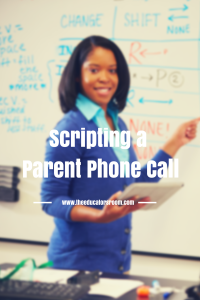 Today many of our communications with parents are through email, blogs and classroom websites. Interactive conversation is a tool we use less and less often. Sometimes there are sensitive, personal, individual or important topics that should be discussed in person over the phone. A good practice is to send positive notes or emails throughout the beginning of the school year. Set the stage for your partnership with parents. Some parents have a negative association with schools; you want to remove this so they understand you are there for the best interest of their student.
Today many of our communications with parents are through email, blogs and classroom websites. Interactive conversation is a tool we use less and less often. Sometimes there are sensitive, personal, individual or important topics that should be discussed in person over the phone. A good practice is to send positive notes or emails throughout the beginning of the school year. Set the stage for your partnership with parents. Some parents have a negative association with schools; you want to remove this so they understand you are there for the best interest of their student.
Surprises are not a good thing with parent communication, be sure and let students know you plan to call their parents before you attempt a parent phone call. I always tell my students I will be calling mom or dad. This can be done on the way out the door, it can be done with the student beside you assisting in making the call, it can be done in a private conversation the day of or the day before the phone call.
There are a few important items I like to have at hand when I make parent phone call. If the situation is academic related I have the student’s portfolio, grades, or tests in front of me. I also have a sticky note pad and pencil as well as a calendar. Parents may request to come speak with you in person. It is easiest and best to make that appointment right there on the phone. I also have a short bulleted list of why I am calling including concerns and positive items such as:
1.Something helpful the student has done in class or for a peer
2Evidence of concern
3.Concern
4.Assistance requested from parent
5.Timeline for improvement
6.Something positive observed in the classroom
Having an outline will help you stay on topic and cover all areas of concern you have. If there are many areas of concern, select the two that will have the most immediate impact on the student’s learning. Start here and save the others for another phone call. You can then use the improvement as a positive on that new list of concerns.
Before making an important phone call to parents, you want to take a few minutes to organize your thoughts and think through the purpose of the call. I always double check parent’s names and contact information. Be sure to see if parents are living together or if there are any custody issues. I try to call parents at home, but if you are making the call during the school day you may need to make the call to work. If you are calling a parent’s place of work do not identify yourself unless asked. Then just use your name to assure privacy for the family. For example say, “Hello, this is Ms. Rice. May I speak with Mr. Johnson, please?”
When you get the parent on the line introduce yourself, “Hello! This is Ms. Rice, from West Elementary. I was calling to talk with you today about John. Is this a good time?” Be sure to provide a compliment or share a quick story about something helpful the student has done in your classroom. Children are our greatest accomplishments. They are an extension of us. As a parent, it is hard to hear criticism about your own child and not take that personally. You want to keep parents in a conversational mode and not put them on the defense.
Carefully ease into the concern you have. Provide specific evidence of the situation. “I have noticed in class (state behavior here). In our classroom (state expectation here). When (state student behavior here) is happening then it is stopping learning for (him, her, others). I have tried (provide specific strategies you have used).” It is a good idea to ask the parent if they are noticing anything similar at home. Also, ask if they have any ideas or if they have found something that works well with their student. They know them best, use this knowledge to your advantage.
Next tell them what you are expecting and what you need from them for support. This can be something as simple as asking them to look for positive notes to come home or reinforcing the expectations at home or having a conversation with the student to support your efforts. It could also be more complex in which you start a communication log or set up a behavior plan. The assistance needed from the family will depend on the situation. Be sure to include a timeline for the changes. Tell the parents what you will be doing in the classroom. Always make sure to ask them if they can see any problems with this plan.
End the conversation on a positive note. “Thank you so much for your open communication and your time. I enjoy (positive observation or antidote) in our classroom. Having your support is such an important part of our learning.” Restate your timeline and what you need from parents. Always remember to keep the door open, “As I hope you know, if there is ever anything you need or any concerns you have please don’t hesitate to contact me.” If you are unsure they have your contact information ask if they need it.
Now, in a perfect world this conversation is fantastic. While you sip your coffee with your feet up in your chair the conversation has gone smoothly. The parents listen and provide insight into the student. BUT, we all know the world is not perfect and you may hit a few speed bumps. If the parent becomes defensive restate what you are doing and focus on sharing evidence of the behavior. Remember that you are talking about their child, an extension of them. Keep in mind they may have a very negative attitude about school and it could be other factors providing the attitude. Keep calm and be curious. What is making the parent feel defensive? What has happened outside of this situation? What is going on at home? Work? If the conversation starts to designate then wrap it up. Skip through that list down to a positive compliment such as, “Thank you for your open communication. I will be (strategy you plan to try) at school over the next week. I would like to call you and share what I have noticed at that time. Is there a better time for me to reach you than (current time)? I enjoy (positive observation or antidote) in our classroom. As I hope you know, if there is ever anything you need or any concerns you have please don’t hesitate to contact me.”
In the rare, extreme situation you could have a parent that becomes upset. I have been yelled at in person and on the phone by parents in very different conversations. When this happens remain calm. “I would like to talk with you more about this. I will, however, have to call you back.” If yelling occurs still remain calm. “I am sorry you are upset. I will call you back at another time.” If it gets to the point you need to end the phone call DO NOT HANG UP without saying, “Thank you for your time. I will call you back on another day. Good bye!” Remain call and polite. Then go to your school friend and share the story, shed tears or just yell to get your frustration out in the confines of your empty classroom.
Communication with parents is critical in the classroom. Remember to think about what you want to say, the reason for making the call, and make a list of your important points. Have all of the supplies you need, find that phone number, take a deep breath and make that call. You will find that most of the conversations will bring you to a better understanding of the student and in the end that is what we are here for.
What’s the most memorable conversation you’ve had with a parent?






I am going to be a volunteer helping with discipline at a school with calling parents or suspensions etc. I like your referral document details as well as having home and work phone numbers. I would love to talk about how you handle students and talking to parents once in the office with student or parent conference.